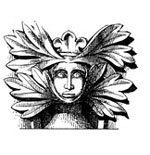
What Is the Purpose of Poetry?
A CONVERSATION WITH CAITLIN SMITH GILSON
Caitlin Smith Gilson is professor of philosophy at University of Holy Cross in New Orleans and visiting professor of philosophy at Pontificia Università della Santa Croce in Rome. She is the author of eight books of Catholic theology, Christian philosophy, and religious poetry. Herein we discuss her latest volume of verse, Rhapsody and Redolence: The Crystal Decade, a cycle of religious poetry and art, co-written with Carol Scott, an award-winning artist and professor emeritus of art at University of Holy Cross.
NOR: In today’s educational milieu, it seems that poetry, particularly religious poetry, is either made a cadaver onto which cultural theorists impose an ideology or seen as mere ornamentation with no value in a world socially determined by economic utility and bottom lines. Poetry was once understood to be an anthropological episteme, a way of knowing, if only through a glass darkly. It was seen, even in the blind but percipient eyes of Homer, as a mimetic art representing the truth of our nature in relation to supernature.
Caitlin Smith Gilson: Such an understanding of poetry, and of philosophy, too, as a way of knowing ourselves sub specie aeternitatis (from the perspective of the eternal), has been, for some time now, in decline. For this reason, there are few thinkers these days in academia, and even fewer poets.
The word philosophy (love of wisdom) is used with ubiquity, but its contradictory pole, philodoxa (love of opinion), is not. Isn’t that a reason to pause? What we call thought, philosophy, and poetry, having lost the demands of Being, having lost Truth, Goodness, and Beauty, have always necessitated more than instantiations of ego, more than the emotivist sentiment, and are the many shades of the unspoken philodoxa. In the land of the ontologically impercipient, we would be fortunate if the one-eyed man is king, for the blind are leading the blind in “higher” education.
NOR: The notion of leading through literature, however, is a vital cultural function. It is as old as Aesop, whose fables are nothing if not maps for the moral imagination. I once opined at a faculty discussion of educational aims that poetry is to science what a mother is to a child. A child is naturally curious but dangerously reckless if his course is not gently directed — or redirected.
You May Also Enjoy
GKC did believe creation and its Creator are good, but not that the majority of people would always choose rightly or that any merely human structure would endure.
A kernel of nihilism undoes whatever meaning modern men try to inject into their own lives.
For the original vampire slayers, most of them nominal Anglicans, the efficacy of Catholic sacramentals and the Sacrament quickly becomes apparent.

